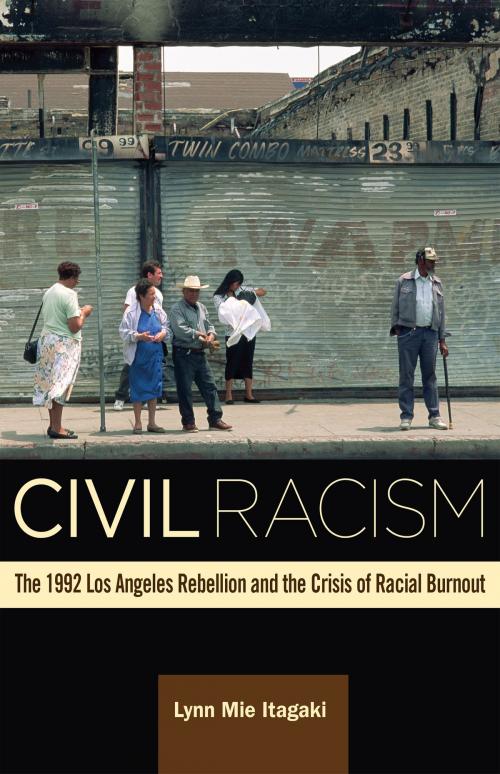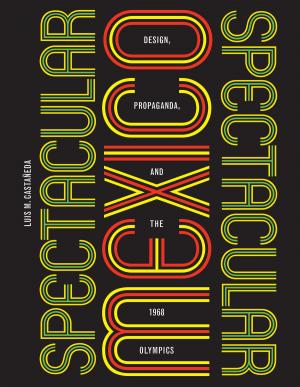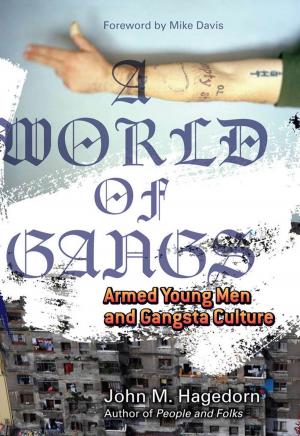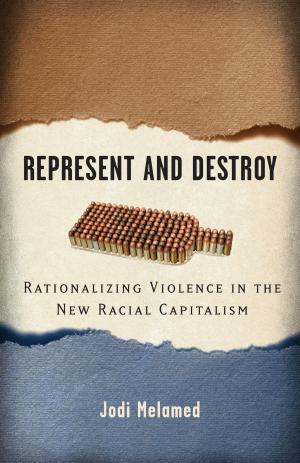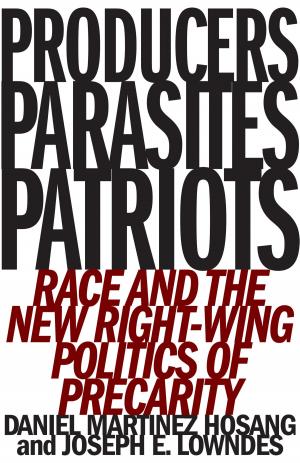Civil Racism
The 1992 Los Angeles Rebellion and the Crisis of Racial Burnout
Nonfiction, Social & Cultural Studies, Social Science, Cultural Studies, Ethnic Studies, Discrimination & Race Relations, African-American Studies| Author: | Lynn Mie Itagaki | ISBN: | 9781452950150 |
| Publisher: | University of Minnesota Press | Publication: | March 15, 2016 |
| Imprint: | Univ Of Minnesota Press | Language: | English |
| Author: | Lynn Mie Itagaki |
| ISBN: | 9781452950150 |
| Publisher: | University of Minnesota Press |
| Publication: | March 15, 2016 |
| Imprint: | Univ Of Minnesota Press |
| Language: | English |
The 1992 Los Angeles rebellion, also known as the Rodney King riots, followed the acquittal of four police officers who had been charged with assault and the use of excessive force against a Black motorist. The violence included widespread looting and destruction of stores, many of which were owned or operated by Korean Americans in neighborhoods that were predominantly Black and Latina/o. Civil Racism examines a range of cultural reactions to the “riots” anchored by calls for a racist civility, a central component of the aesthetics and politics of the post–civil rights era.
Lynn Mie Itagaki argues that the rebellion interrupted the rhetoric of “civil racism,” which she defines as the preservation of civility at the expense of racial equality. As an expression of structural racism, Itagaki writes, civil racism exhibits the active—though often unintentional—perpetuation of discrimination through one’s everyday engagement with the state and society. She is particularly interested in how civility manifests in societal institutions such as the family, the school, and the neighborhood, and she investigates dramatic, filmic, and literary texts by African American, Asian American, and Latina/o artists and writers that contest these demands for a racist civility.
Itagaki specifically addresses what she sees as two “blind spots” in society and in scholarship. One is the invisibility of Asians and Latinas/os in media coverage and popular culture that, she posits, importantly shapes Black–White racial formations in dominant mainstream discourses about race. The second is the scholarly separation of two critical traditions that should be joined in analyses of racial injustice and the 1992 Los Angeles rebellion: comparative race studies and feminist theories.
Civil Racism insists that the 1992 “riots” continue to matter, that the artistic responses matter, and that—more than twenty years later—debates about issues of race, ethnicity, class, and gender are more urgent than ever.
The 1992 Los Angeles rebellion, also known as the Rodney King riots, followed the acquittal of four police officers who had been charged with assault and the use of excessive force against a Black motorist. The violence included widespread looting and destruction of stores, many of which were owned or operated by Korean Americans in neighborhoods that were predominantly Black and Latina/o. Civil Racism examines a range of cultural reactions to the “riots” anchored by calls for a racist civility, a central component of the aesthetics and politics of the post–civil rights era.
Lynn Mie Itagaki argues that the rebellion interrupted the rhetoric of “civil racism,” which she defines as the preservation of civility at the expense of racial equality. As an expression of structural racism, Itagaki writes, civil racism exhibits the active—though often unintentional—perpetuation of discrimination through one’s everyday engagement with the state and society. She is particularly interested in how civility manifests in societal institutions such as the family, the school, and the neighborhood, and she investigates dramatic, filmic, and literary texts by African American, Asian American, and Latina/o artists and writers that contest these demands for a racist civility.
Itagaki specifically addresses what she sees as two “blind spots” in society and in scholarship. One is the invisibility of Asians and Latinas/os in media coverage and popular culture that, she posits, importantly shapes Black–White racial formations in dominant mainstream discourses about race. The second is the scholarly separation of two critical traditions that should be joined in analyses of racial injustice and the 1992 Los Angeles rebellion: comparative race studies and feminist theories.
Civil Racism insists that the 1992 “riots” continue to matter, that the artistic responses matter, and that—more than twenty years later—debates about issues of race, ethnicity, class, and gender are more urgent than ever.
